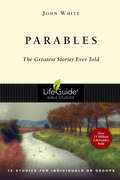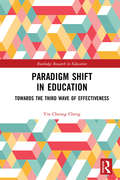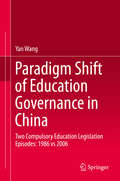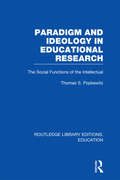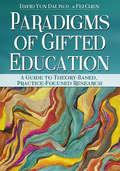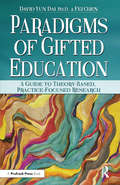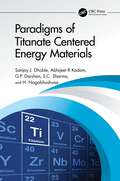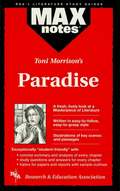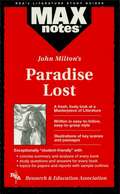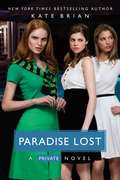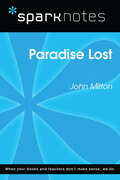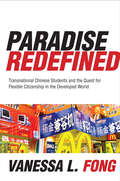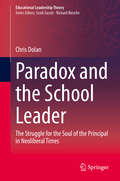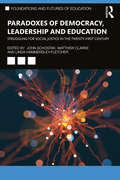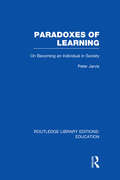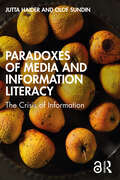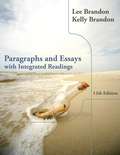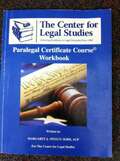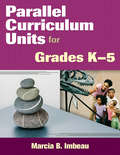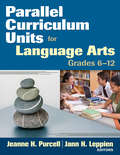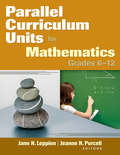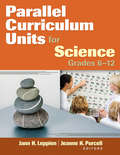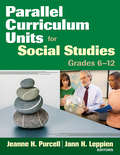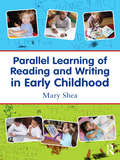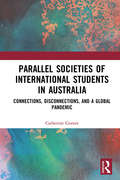- Table View
- List View
Parables: The Greatest Stories Ever Told (LifeGuide Bible Studies)
by John WhiteWe all love a good story. But the parables of Jesus are even better than that. They sneak up on us, catching us off guard and toppling our easy assumptions. When the familiar takes an unexpected twist, we find our secret thoughts exposed to the healing light of Jesus. This Bible study introduces twelve of the greatest stories ever told; how might they change your thoughts and actions?
Paradigm Shift in Education: Towards the Third Wave of Effectiveness (Routledge Research in Education)
by Yin Cheong ChengAs social contexts and demands change in the 21st century, pedagogies and policies must adapt to keep up. Increasing emphasis on global preparedness, competitivity, and holistic education alongside a fast-paced, ever-changing environment may make policy implementation difficult. However, Cheng asserts that it is only by understanding the current trends, visions, and issues in education policy, implementation, and research that we can reflect, adapt, and improve future initiatives. To that end, Cheng elucidates the different paradigm shifts in classrooms and pedagogy all over the world. In his exploration of third-wave paradigm shifts in education, he charts the rationales, concerns, and effects in topics such as contextualized multiple intelligences, integrated learning, national education in globalization, teacher effectiveness and development, school-based management, and systemic education reform. This book is a promising referential resource for any policy-maker, academic, and educator who knows that the only way to progress is to look at and learn from the current issues and future trends globally.
Paradigm Shift of Education Governance in China: Two Compulsory Education Legislation Episodes: 1986 vs 2006
by Yan WangThe book addresses the paradigm shift in education governance in China through a study of two legislation episodes in China: the 1986 Compulsory Education Law and the 2006 Compulsory Education Law Amendment. The research began with two broad questions: how was the Compulsory Education Law made and amended? Why was it made and amended? Using ethnographic interviews and documentary analysis as the main research methods, more specific questions on both legislative processes were delved into as the research evolved: What were the driving forces behind the 1986 and 2006 legislation? What values of compulsory education were assumed in their central decisions? What was the institutional rationale underpinning them? Data was collected through ethnographic interviews with key informants involved in the policymaking process. The research findings were analyzed and presented on the basis of narration analysis. The policymaking process of the legislation was then analyzed from three paradigms: agenda-setting, decision-making and organizational behavior. Finally, by examining the results of the previous stages of analysis, and further comparing the two cases, the research arrived at a theoretical framework for education governance that embraces three essential elements: political ideology, perceived value of education, and institutional rationale. A thorough analysis of the two legislative processes identified that the political ideology ‒ which shifted from efficiency-oriented economic well-being to equity-oriented social cohesion ‒ steered the agenda-setting of the compulsory education legislation. The perceived value of education reflects the role that education plays in development, changing from economic value to social value. The institutional rationale essentially determines strategies by which compulsory education materializes, with a variance from governing by goal and mobilization to governing by accountability and regulation. In conclusion, education governance in China witnessed a paradigm shift from “economic instrumentalism” to “social rationalism” between mid-1980s and 2006.
Paradigm and Ideology in Educational Research: The Social Functions of the Intellectual (Routledge Library Editions: Education)
by Thomas S PopkewitzThis book explores the complex social assumptions and values that underlie research programmes about schools. The analysis of educational research draws upon American and European scholarships in the sociology of knowledge, social philosophy and the history and sociology of science. The discussion considers first the communal, crafts and social characteristics of educational research. Three research models empirical-analytic, symbolic or linguistic and critical sciences are given attention. The discussion of the three research models is to illuminate how the constellation of commitments, assumptions and practices inter-relate to perform a paradigm giving different and conflicting definitions to the meaning of educational theory and to the use of the particular techniques of enquiry. The social role of educational research and the researcher is also considered.
Paradigms of Gifted Education
by Fei Chen David Yun DaiThis book highlights how to conduct research in gifted education when researchers have to choose from myriad theoretical ideas, hypotheses, claims, practical models, and strategies. It shows researchers how to build clarity, rigor, and relevance into a research agenda that combats fragmentation and contributes to enhanced theoretical and practical endeavors in the field. Specifically, the book advocates a paradigmatic approach to conducting research in gifted education, and shows how it can be done every step of the way by specifying the essential questions of What?, Why?, Who?, and How? in a coherent manner, and by selecting methods that are appropriate for the question asked and the phase of the research efforts. To facilitate the development of a research agenda, the book identifies three major paradigms of gifted education and 20 essential research questions that would help move the field forward.
Paradigms of Gifted Education: A Guide for Theory-Based, Practice-Focused Research
by Fei Chen David Yun DaiThis book highlights how to conduct research in gifted education when researchers have to choose from myriad theoretical ideas, hypotheses, claims, practical models, and strategies. It shows researchers how to build clarity, rigor, and relevance into a research agenda that combats fragmentation and contributes to enhanced theoretical and practical endeavors in the field. Specifically, Paradigms of Gifted Education advocates a paradigmatic approach to conducting research in gifted education and shows how it can be done every step of the way by specifying the essential questions of What?, Why?, Who?, and How? in a coherent manner, and by selecting methods that are appropriate for the question asked and the phase of the research efforts. To facilitate the development of a research agenda, the book identifies three major paradigms of gifted education and 20 essential research questions that would help move the field forward.
Paradigms of Titanate Centered Energy Materials
by Sanjay J. Dhoble S.C. Sharma Abhijeet R Kadam G.P. Darshan H. NagabhushunaTitanate-centered perovskites are an important class of crystalline materials with outstanding structural and property tunability. Recently, titanate perovskites have been extensively investigated as new-generation materials for various energy-allied applications, together with photovoltaic cells, light emitting diodes, photo detectors and lasers, for their exceptional optical and electronic properties. With increasing attention on the development of nanotechnology and multidisciplinary research, scientists have been trying to downscale the titanate perovskite structures into the nanoregime, so as to further boost their performances and applications. Compared with bulk perovskite materials, perovskite nanomaterials exhibit a series of advantages, such as fabrication of thin films and flexible devices and PNMs display high process ability. Perovskite nanomaterials feature rich and controllable facets and active sites. Besides benefiting from the small-size effect and quantum effect, perovskite nanomaterials are endowed with outstanding photo-electromagnetic properties. Furthermore, the applications of titanate-centered perovskites in the fields of energy, environment, WLEDs, forensic science and piezoelectric devices will be reviewed. This book will also discuss the possible solutions to the problems in their application by optimizing their compositions, structures and preparation methods. This book will systematically summarize the key points in the design, synthesis, property improvements and application expansion of titanate-centered perovskites. The different perovskite structures and the rational design of functional materials will be discussed in detail. The advantages, disadvantages and experimental parameters of different synthesis methods for titanate-centered perovskites will be reviewed. This book will also summarize some practical experiences in selecting suitable elements and designing multifunctional materials according to the mechanisms and principles of elements promoting the properties of perovskites by covering almost last 20 years of literature. At the end of this book, we will provide an outlook on the opportunities and challenges in the view of development in titanate-centered perovskites The inclusive effectiveness and practicality of prospective titanate energy materials and systems are directly connected to many materials-related factors. This volume of book features totally seven sections that envelop a wide range of titanate energy materials. They cover the modern developments involving materials for alternative and renewable energy sources and systems, including energy storage and batteries, nanocomposites, hydrogen, solar, wind, geothermal, biomass and nuclear. The book is a significant orientation for students and researchers (from academics, but also industry) interested in understanding the properties of emerging titanate energy materials and challenges in the recent era.
Paradise (MAXNotes Literature Guides)
by David GracerREA's MAXnotes for Toni Morrison's Paradise MAXnotes offer a fresh look at masterpieces of literature, presented in a lively and interesting fashion. Written by literary experts who currently teach the subject, MAXnotes will enhance your understanding and enjoyment of the work. MAXnotes are designed to stimulate independent thought about the literary work by raising various issues and thought-provoking ideas and questions. MAXnotes cover the essentials of what one should know about each work, including an overall summary, character lists, an explanation and discussion of the plot, the work's historical context, illustrations to convey the mood of the work, and a biography of the author. Each chapter is individually summarized and analyzed, and has study questions and answers.
Paradise Lost (MAXNotes Literature Guides)
by Corinna RuthREA's MAXnotes for John Milton's Paradise Lost MAXnotes offer a fresh look at masterpieces of literature, presented in a lively and interesting fashion. Written by literary experts who currently teach the subject, MAXnotes will enhance your understanding and enjoyment of the work. MAXnotes are designed to stimulate independent thought about the literary work by raising various issues and thought-provoking ideas and questions. MAXnotes cover the essentials of what one should know about each work, including an overall summary, character lists, an explanation and discussion of the plot, the work's historical context, illustrations to convey the mood of the work, and a biography of the author. Each chapter is individually summarized and analyzed, and has study questions and answers.
Paradise Lost (Private Series #9)
by Kate Brian Julian Peploe Andrea C. UvaParadise awaits.... Now that Cheyenne's murderer has been revealed and Reed knows the truth about who's been stalking her, she's ready to leave the heartache and turmoil of last semester behind. And what better way to recover than a five-star Caribbean vacation? Reed is reunited with former Billings Girls Kiran and Taylor, and she and her friends take over the exclusive island. They spend their days tanning on white-sand beaches and their nights partying on sixty-foot yachts. It's heaven on earth. But as they raise their champagne flutes to toast their friendship, Reed worries that it's all too good to be true. Because even in paradise, the Billings Girls are never far from trouble -- and nothing's more dangerous than the calm before the storm....
Paradise Lost (SparkNotes Literature Guide Series)
by SparkNotesParadise Lost (SparkNotes Literature Guide) by John Milton Making the reading experience fun! Created by Harvard students for students everywhere, SparkNotes is a new breed of study guide: smarter, better, faster. Geared to what today's students need to know, SparkNotes provides: *Chapter-by-chapter analysis *Explanations of key themes, motifs, and symbols *A review quiz and essay topicsLively and accessible, these guides are perfect for late-night studying and writing papers
Paradise Redefined
by Vanessa L. FongIn 2004, Vanessa Fong offered a groundbreaking ethnographic exploration of the social, economic, and psychological development of children born since China's one-child policy was introduced in 1979. Her book Only Hope left readers with a picture of stressed, ambitious adolescents for whom elite status was the ultimate goal, though relatively few were in a position to achieve it. In Paradise Redefined, Fong tracks the experiences of many in her initial cohort of Chinese only-children—now college-age—as they study abroad in Australia, Europe, Japan, New Zealand, North America, and Singapore. While earning a prestigious college education in China is the main path to elite status, study abroad provides an alternative channel by offering a particularly flexible "developed world" citizenship. This flexible citizenship promises the potential for greater happiness and freedom afforded by transnational mobility, but also brings with it unexpected suffering, ambivalence, and disappointment. Paradise Redefined offers insights into China's globalization by examining the expectations and experiences that affect how various Chinese students make decisions about studying abroad, staying abroad, immigration, and returning home.
Paradox and the School Leader: The Struggle for the Soul of the Principal in Neoliberal Times (Educational Leadership Theory)
by Chris DolanThis book proposes that paradox, as a theoretically rich and historically enduring concept, has significant potential for researchers in the field of critical leadership studies. By enriching its general form and infusing it with added complexity and theoretical influence, it is argued that paradox can be legitimately applied as a lens for examining and as a pedagogy for realising new learning possibilities.The book takes paradoxes as formed out of the constitutive practices of discourse rather than as representations of conflict or complexity. Using fifteen paradoxes derived from theoretical and empirical analysis, it provides insights into the competing forces that contradict simplistic positivist accounts of contemporary school leadership and reveal the presence of a political struggle for the soul of the principal in the neoliberal era. It considers these paradoxes in three categories: (1) principal subjectivity and authority, (2) neoliberal policy and (3) managerial practice. The book advocates critique, counter-conduct and agonistic thought and practice as resources for principals participating in such a struggle, and employs Foucault's 'care of the self' and 'practices of freedom' to promote more active involvement of principals in authoring their ethical and political selves.
Paradoxes of Democracy, Leadership and Education: Struggling for Social Justice in the Twenty-first Century (Foundations and Futures of Education)
by John SchostakParadoxes of Democracy, Leadership and Education engages both critically and creatively with important social, political and educational issues, and argues that the organisational forms of contemporary schooling are caught up in politically significant contradictions. Highlighting the inescapable paradoxes that educators must grapple with in their thought and practice as they seek to reconcile democracy and leadership in education, this book addresses the question of whether socially just democratic futures can be realised through education. Divided into two parts, the first part explores theoretical frameworks and concepts, presenting theory and raising issues and questions, while the second shares diverse examples of practice, renewing and reanimating the links between education, leadership and democracy, and providing models of alternatives. Studying a number of global developments that can be seen as potentially threatening, such as a growing inequality in wealth and income and the declining participation and trust in democratic processes, this text is at the forefront of international innovations in educational theory and philosophy. A fascinating and vital read for all researchers and students, Paradoxes of Democracy, Leadership and Education considers the opportunities and challenges that are confronting and threatening education in the modern world.
Paradoxes of Learning: On Becoming An Individual in Society (Routledge Library Editions: Education)
by Peter JarvisAs more is discovered about the powerful impact of lifelong learning on adults, educators are changing their views about how, when and where we learn. Learning is no longer defined only in the context of formal educational settings but in social context as well – including families, the workplace, and religious and political groups. This book explores how learning is our lifetime quest to understand personal identity, purpose and meaning while conforming and adapting to the perceived and real confines of our paradoxical society. The author examines the complex social experience of learning, revealing how culture, gender, race and other societal factors shape an individual’s identity and ability to function in relationships – the basis of all learning. He also discusses the difficult paradox of cultivating creative thinking and reflective action in a society that values the acquisition of degrees, certificates and titles over actual learning and growth.
Paradoxes of Media and Information Literacy: The Crisis of Information
by Jutta Haider Olof SundinParadoxes of Media and Information Literacy contributes to ongoing conversations about control of knowledge and different ways of knowing. It does so by analysing why media and information literacy (MIL) is proposed as a solution for addressing the current information crisis. Questioning why MIL is commonly believed to wield such power, the book throws into sharp relief several paradoxes that are built into common understandings of such literacies. Haider and Sundin take the reader on a journey across different fields of practice, research and policymaking, including librarianship, information studies, teaching and journalism, media and communication and the educational sciences. The authors also consider national information policy proposals and the recommendations of NGOs or international bodies, such as UNESCO and the OECD. Showing that MIL plays an active role in contemporary controversies, such as those on climate change or vaccination, Haider and Sundin argue that such controversies challenge existing notions of fact and ignorance, trust and doubt, and our understanding of information access and information control. The book thus argues for the need to unpack and understand the contradictions forming around these notions in relation to MIL, rather than attempting to arrive at a single, comprehensive definition. Paradoxes of Media and Information Literacy combines careful analytical and conceptual discussions with an in-depth understanding of information practices and of the contemporary information infrastructure. It is essential reading for scholars and students engaged in library and information studies, media and communication, journalism studies and the educational sciences.
Paragraphs and Essays: With Integrated Readings (12th Edition)
by Kelly Brandon Lee BrandonThis classic text offers comprehensive, proven instruction in developmental writing. Paragraphs and Essays: With Integrated Readings is the higher-level companion to Sentences, Paragraphs, and Beyond in the bestselling two-book Brandon series. Instruction in this text--comprehensive, flexible, and relevant--is predicated on the idea that reading and writing are linked and that good writing is the product of thoughtful and systematic revision.
Paralegal Certificate Course Workbook
by Margaret J. KirkThis book is designed to be used in conjunction with the Paralegal Certificate Course and other paralegal studies courses to quickly and efficiently prepare paralegals. The notes and exercises are designed to reinforce course lesson materials, and to help the student learn to apply the concepts and practical skills necessary for a successful paralegal career.
Parallel Curriculum Units for Grades K–5
by Dr Marcia B. ImbeauThe empirically based Parallel Curriculum Model shows teachers how to create meaningful, emotive, and engaging curriculum that challenges all learners according to their interests and abilities.
Parallel Curriculum Units for Language Arts, Grades 6-12
by Dr Jeanne H. Purcell Jann H. LeppienSample units demonstrate how to use the Parallel Curriculum Model to design high-quality curriculum in language arts. Each unit includes instructions, assessments, and skills/standards.
Parallel Curriculum Units for Mathematics, Grades 6–12
by Dr Jann H. Leppien Dr Jeanne H. PurcellMaximize your mathematics curriculum to challenge all students This collection of lessons from experienced teachers provides multifaceted examples of rigorous learning opportunities for mathematics students in Grades 6–12. The four sample units focus on fractions, linear programming, geometry, and quadratic relationships. The authors provide user-friendly methods for instruction and demonstrate how to differentiate the lessons for the benefit of all students. Included are standards-based strategies that guide students through: Understanding secondary mathematics concepts Discovering connections between mathematics and other subjects Developing critical thinking skills Connecting mathematics learning to society through the study of real-world data, proportional reasoning, and problem solving
Parallel Curriculum Units for Science, Grades 6-12
by Dr Jann H. Leppien Dr Jeanne H. PurcellBreathe new life into science learning with this powerful guidebook that shows how to create more thoughtful curriculum and differentiate lessons to benefit all students.
Parallel Curriculum Units for Social Studies, Grades 6-12
by Dr Jann H. Leppien Dr Jeanne H. PurcellCovering history, geography, and sociology, these sample lessons and units show how to use the Parallel Curriculum Model to provide rigorous learning opportunities for students in social studies.
Parallel Learning of Reading and Writing in Early Childhood
by Mary SheaParallel Learning of Reading and Writing in Early Childhood explores why it’s important to provide a balanced language learning environment for young children and offers approaches for children to practice and explore language. Writing – a different but parallel process – can open the door to reading, and an effective writing approach in the home and early childhood classrooms leads to the development of phonemic awareness, understanding of phonetic principles, vocabulary, fluency, and comprehension. Effective early childhood teachers are those that extend the knowledge children have amassed at home and use the knowledge of how children learn naturally in the world to inform their practice. This book offers the purpose, context, and outcomes of including writing right from the start in young children’s literacy learning. Through analysis of writing samples, research, and principles of best practices, Shea outlines the essential ingredients for early language learning and provides a developmentally appropriate approach to language learning. Throughout the chapters, Shea integrates discussion of assessment, classroom environment, instructional/teacher scaffolding, and differentiating instruction across developmental levels along with the supporting theory. Special features: vignettes and descriptions of Pre-K, K, and Grade 1 classrooms that incorporate writing across the day artifacts of children’s writing that demonstrate an evolution of knowledge related to both message and word construction concept labeling words and topic specific terms defined throughout the book to support the reader’s understanding of professional terminology discussion of seminal and current research as well as best practices Companion Website with lesson ideas and abundant writing samples from a wide range of demographic, cultural, and language contexts for readers to view, analyze, and discuss. This text offers pre- and in-service early childhood education teachers the content and resources to develop a deeper understanding of language learning, to prompt an examination of current practice, and to stimulate curricular re-designs that foster meaningful, joyful, and motivated learning.
Parallel Societies of International Students in Australia: Connections, Disconnections, and a Global Pandemic
by Catherine GomesParallel Societies of International Students in Australia explores the social and cultural spaces that international students occupy in destination countries. It specifically examines the connections they make and the significance of this parallel society in helping them become resilient, empowered and self-sufficient. It further explores the way in which international students become disconnected from the family and friends they left behind at home, as well as from local communities. Drawing on a decade worth of research into the social, cultural, real and digital spaces occupied by international students in Australia, the book also reflects on the biggest challenge humanity has faced in a hundred years; the COVID-19 global pandemic. It considers the impact that the decisions made by the Australian government and international education stakeholders in response to this evolving crisis have had on international students. This book will be of interest to academics and stakeholders involved in international education and working with international students.
